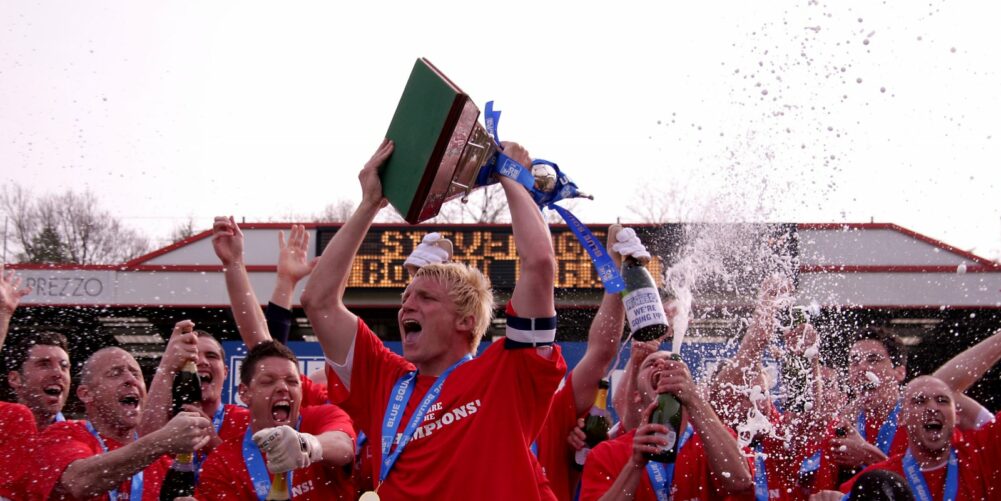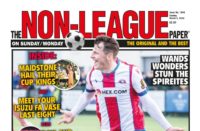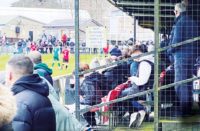(CHAMPIONS: Mark?Roberts lifts the Conference Trophy with Stevenage and right, manager Graham Westley. PICTURE: Simon Cooper)
By Matt Badcock
Just the mere mention of the Stevenage side that powered its way into the Football League and to the brink of the Championship was enough to bring opposition players out in a cold sweat.
Manager Graham Westley assembled one of the most memorable teams in Conference history, built on strength, unity and a sheer bloody mindedness to win games of football.
Having lifted the FA Trophy in 2009 and missed out in the play-offs, the club – then still known as Stevenage Borough – won the title the next season.
Promotion from League Two was immediate – along with an FA Cup third round scalp of Premier League Newcastle United – before they made the League One play-offs in their first season at that level too. It was an incredible period in their history and leading at the front was their centre-back and captain Mark Roberts.
“There were a number of players, like myself, who had been at different levels and we just seemed to come together at the right time in our careers and point in our lives where, maybe we'd failed at other places or things hadn't worked out,” Roberts, now at Warrington Town, says.
“Players who were looking to find their feet and their true potential. Graham Westley, (assistants) Dino Maamria and John Dreyer were able to get that out of us.
“And we were able to get that out of each other. We pushed each other every day. Even when we went up to League Two, we wanted to kick on again. When we went up to League One we were ever so close to getting in the Championship.
Honour
“I guess the secret was keeping a core of the team together, the recruitment of players along the way was important, but mainly it was down to sheer belief and hard work – and thinking anything was possible if you put your mind to it.”
In the years since, the team is spoken about as being one of the toughest. The aura they emitted could put them 1-0 up in the tunnel before the game.
The fact they were a talented group – Andy Drury, Laurie Wilson and John Mousinho went on to play in the Championship – shouldn't go unmentioned. But it was a squad of players desperate to maximise themselves and put the hours in.
Roberts uses the term “misfits” loosely but they were a resilient bunch, capable of answering the questions constantly asked of them as they stepped up the leagues.
Whether that was in the Conference, against a big club in League One or Newcastle in the FA Cup, they always had belief. Westley also showed Roberts what was required to achieve.
“I'd always classed myself as a winner,” Roberts says.” I'd always classed myself as someone who was willing to find any way possible of improving himself, whether that was working hard or finding new ways to get a competitive edge as a player.
“But it wasn't until I went to Stevenage I saw what winning really looked like. Not just the hard work, but the dedication, the sacrifice, the mindset where you felt you could stand on tip-toes. Graham Westley helped me and other people see that.
“He often used a phrase, ‘The chain is as strong as its weakest link'. So, although he was pushing us on a daily basis – on the training ground and off it as well because we did a lot of work in the classroom – a lot of it was self-governed. We were pushing each other. If one of us fails, we all fail. If one person succeeds, we all succeed together. There was a real team ethic and togetherness. He empowered me as a leader of that group and it was an honour to captain a team where you looked at each other in the dressing room and you knew they'd run through a brick wall for you. That was the most special thing about that time and something I will take with me for the rest of my life and inspire me to influence people in the best possible way.”
As a 20-year-old, Roberts had broken into Crewe Alexandra's team in the Championship before, just a few games in, he suffered an ACL injury.
“He never played at that level again but it gave him an understanding of the importance of planning for his next career.
Comfort zone
“I never wanted to be seen as just a footballer,” he says. “I've always tried to develop myself in a number of different ways and I guess that was one of the great advantages of playing at Stevenage that I developed as a person as well as a player.”
Roberts, who has been part of the PFA's management committee, earned a degree in sports journalism while at Boro, has his coaching badges and is now at Salford University pursuing his Masters for CEOs in Sport.
“It's taken me out of my comfort zone,” he says. “I'm really passionate about players getting into the business side of the industry. Professional players, semi-professional players, if you're an athlete you're a competitor first and foremost and I think you've got so much to add to the business side. You've got a different perspective and experiences people can only wish they had themselves.
“I think that makes us as athletes unique and, ultimately yes, the ambition is to either run a football club or be at the very top influencing an organisation in that way.
“The end of a football career, I don't see as the end of a life. I'm hugely ambitious, I'm very driven and I want to see how far I can get.”
Roberts is one of an increasing trend of professionals addressing what they will do when the boots are hung up before they actually are – and he wants more to do the same. “I came through the system at Crewe Alex with Dean Ashton,” Roberts says.
“He obviously went on to play for England and it's great to see him doing well as a pundit now for Sky Sports. But his career was cut short when he was in his 20s.
“It doesn't matter how talented you are – and Dean was always the one who was going to make it from our age group – but his career was taken away from him. You're then faced with 30, 40, 50 years of your working life.
“There's so many opportunities out there now. Although education would have been a safer option for me when I left school, I wanted to pursue my dream of becoming a professional footballer. I'm very grateful and very privileged to live that life. Now I get to create another dream for myself.
“So partly out of necessity, partly out of intrigue, there are players out there who are educating themselves and feel they have a voice or a platform to make positive change.
“I got to see that with the management committee at the PFA. There are some really intelligent people working at different levels of football and those people will find roles where they're influencing the game of tomorrow.”
Roberts joined Paul Carden's Warrington in the summer after leaving Forest Green Rovers and deciding the time was right to move back to his north-west roots so his young family can also be settled.
Being part of a club pushing for promotion from the NLP Premier Division is also giving the 35-year-old the opportunity to keep his competitive edge on the pitch.
“That's one of the beauties of signing for Warrington, it's helped me enjoy my football again,” he says.
“There's a really good set of lads here, Cards has been brilliant to me, I get on really well with Bees (assistant Mark Beesley) as well – it's just nice to be part of something trying to be successful.
Progressive
“Cards was telling me how they were planning on challenging at the top end of the table. A lot of players have changed, as is typical of this level, over the close season but he's assembled a really young, hungry and fit squad with every chance of being up there come the end of the season.
“Throughout my career I've tried to sign for clubs that are ambitious – either at the start or already on a journey of wanting to be successful.
“At Warrington you've got a chairman who is very progressive, wants to bring success to the club and help it grow. I live local to the ground and often wondered why a club like Warrington hasn't kicked on because it's a big town, there's a lot of support.
“I guess it's up to us on the pitch to try and capture the interest of the local people and try to move the club forward. If I can be part of that in any way, it's an added benefit to being a Warrington Town player.”




















